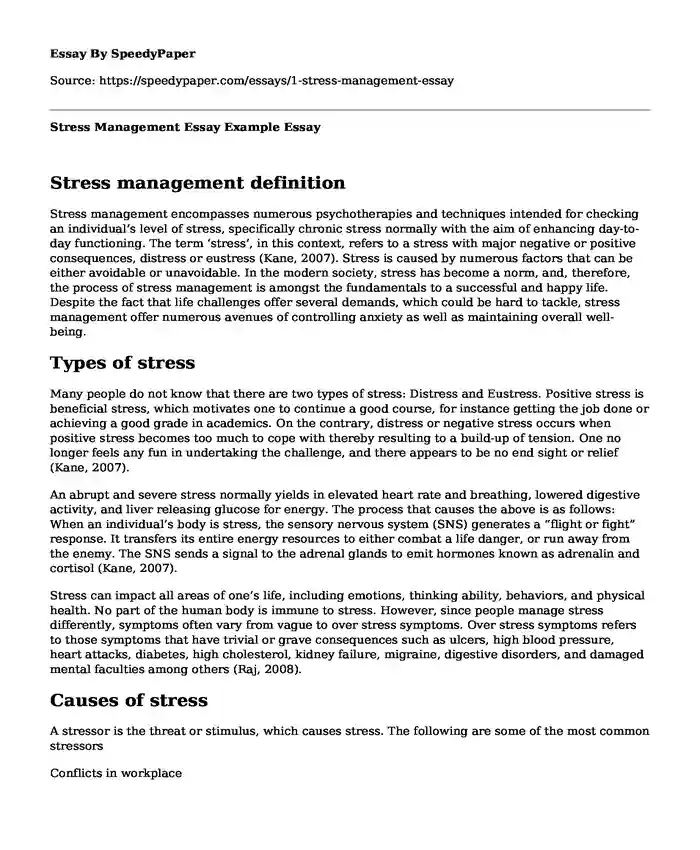
| Type of paper: | Essay |
| Categories: | Psychology Stress Stress management |
| Pages: | 3 |
| Wordcount: | 729 words |
Stress management definition
Stress management encompasses numerous psychotherapies and techniques intended for checking an individual’s level of stress, specifically chronic stress normally with the aim of enhancing day-to-day functioning. The term ‘stress’, in this context, refers to a stress with major negative or positive consequences, distress or eustress (Kane, 2007). Stress is caused by numerous factors that can be either avoidable or unavoidable. In the modern society, stress has become a norm, and, therefore, the process of stress management is amongst the fundamentals to a successful and happy life. Despite the fact that life challenges offer several demands, which could be hard to tackle, stress management offer numerous avenues of controlling anxiety as well as maintaining overall well-being.
Types of stress
Many people do not know that there are two types of stress: Distress and Eustress. Positive stress is beneficial stress, which motivates one to continue a good course, for instance getting the job done or achieving a good grade in academics. On the contrary, distress or negative stress occurs when positive stress becomes too much to cope with thereby resulting to a build-up of tension. One no longer feels any fun in undertaking the challenge, and there appears to be no end sight or relief (Kane, 2007).
An abrupt and severe stress normally yields in elevated heart rate and breathing, lowered digestive activity, and liver releasing glucose for energy. The process that causes the above is as follows: When an individual’s body is stress, the sensory nervous system (SNS) generates a “flight or fight” response. It transfers its entire energy resources to either combat a life danger, or run away from the enemy. The SNS sends a signal to the adrenal glands to emit hormones known as adrenalin and cortisol (Kane, 2007).
Stress can impact all areas of one’s life, including emotions, thinking ability, behaviors, and physical health. No part of the human body is immune to stress. However, since people manage stress differently, symptoms often vary from vague to over stress symptoms. Over stress symptoms refers to those symptoms that have trivial or grave consequences such as ulcers, high blood pressure, heart attacks, diabetes, high cholesterol, kidney failure, migraine, digestive disorders, and damaged mental faculties among others (Raj, 2008).
Causes of stress
A stressor is the threat or stimulus, which causes stress. The following are some of the most common stressors
Conflicts in workplace
Unfair treatment of a worker by his or her boss
Institutional policies
Unclear expectations
Urgent deadlines
Death of a loved one
Divorce
Loss of job
Lack of job security
Increased pressure to perform in a given task
Too much work
Exam
Moving from loved ones.
Type A personality traits are ambitious, controlling, aggressive, highly competitive, lack patience, hostile, and highly competitive. They are reputedly more prone to heart attacks. On the contrary, people with Type B personality traits naturally work steadily, and may derive satisfaction from achievement, but are more likely to overlook mental or physical stress when they do not attain success. Assertiveness is the ability to show or possess a forceful and confident personality.
Several practical techniques of stress management are available, some for self-help and others, for use by health professionals that may assist a person lower their stress levels, offer beneficial feelings of control over an individual’s life, as well as foster general well-being. Some of the techniques for stress management that have proven to work include meditation, cognitive therapy, conflict resolution, relaxation techniques, time management, and natural medicine among others (Raj, 2008).
Conclusion
Stress management is an integral aspect of an individual’s daily life as it helps in controlling anxiety as well as maintaining overall well-being. Stress can either be positive or negative. Positive stress has beneficial consequences while negative one has trivial consequences. Moreover, the human body is designed in a way that enables it to react to stressors by generating a “fight or flight” response depending on the stimuli. Several situations can cause stress. Examples include divorce, death of a loved one, and loss of job. Some people can handle stress more than others. For instance, Type A personalities are affected by stress, hence more prone to heart attacks than their Type B counterparts.
References
Kane, H. (2007). Stress management. Chandni Chowk, Delhi: Global Media.
Raj, K. (2008). Stress management. Delhi: IVY Pub. House.
Cite this page
Stress Management Essay Example. (2017, Oct 25). Retrieved from https://speedypaper.com/essays/1-stress-management-essay
Request Removal
If you are the original author of this essay and no longer wish to have it published on the SpeedyPaper website, please click below to request its removal:
- Speech-Language Pathology - Free Paper with Annotated Bibliography Assignment
- Essay Sample: Violent Video Games and Aggression in Children
- Essay Sample Considering College Student-Athletes
- Free Paper Sample on a Feminist Overview of the Salem Witch Trials
- Antitrust Case Analysis
- Free Essay - The Main Points From the Video
- Essay Sample: Social Media Marketing Case Study
Popular categories




